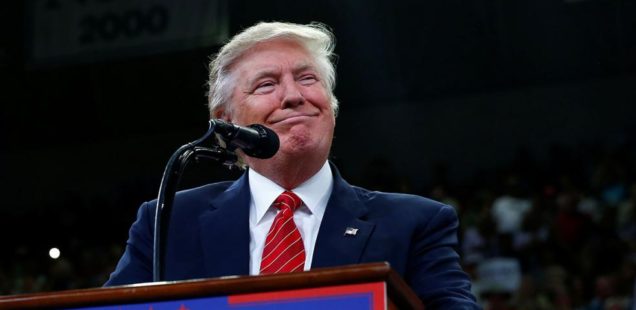
Bashing Trump Is Easy. Seeing His Foreign Policy Is Smart Takes Guts
Is Donald Trump “dangerous,” as 50 G.O.P. national security “experts” asserted in an open letter—the second this year—published last week? Would he be “the most reckless president in American history,” as they also warned?
Jeffrey Goldberg calls Trump “a de facto agent of Vladimir Putin,” in The Atlantic. Paul Krugman’s column in The New York Times is headlined, “Donald Trump, the Siberian Candidate.” And Jackson Diehl in The Washington Post called Trump “as pure an American expression of Putinism as we are likely to see.”
Related: Would Trump Really Be the Most Reckless American President?
Have yesteryear’s policy experts and today’s pundits lost their grip? Are we now treated to a festival of overstatement whenever the topic is Donald Trump?
There are 50 reasons not to support Trump’s Republican candidacy for president. For the record, this columnist is on board for 49 of them.
But the epithets, shouting, and campaign-trail politicking obscure one stance that deserves very serious attention. Among the few things Trump has made clear about his foreign policy thinking is his willingness to negotiate with those Washington considers adversaries in recognition of what legitimate interests they may have.
That’s radically short of a full-dress policy platform, of course. But it puts Trump in curious company—perfectly respectable.
The thought that post–1945 American primacy can’t be sustained in the 21st century is fast achieving the status of a no-brainer. Those who argue otherwise start to resemble Dutch boys with their fingers in dikes, except that they’re not going to prevail against our turbulent seas.
Related: Reeling from a Week in Hell, Trump Forces Try to Push Back
The interesting question now is, “Where do we go from here?” There are lots of answers, but one is for an era of restraint in American foreign policy. And for all Trump’s huffing and puffing, he appears to line up with it.
Barry Posen, an M.I.T. professor, made the case two years ago in Restraint: A New Foundation for American Grand Strategy. It’s a conservative argument—a moral argument, too—against what Posen calls the “liberal hegemony” Washington has assiduously sought since the Cold War. If the phrase summons Hillary Clinton to your mind your mind is in working order.
The libertarians—Rand Paul and a few other elected officials prominent among them—take similar positions to Posen. The Cato Institute held a conference this summer under the banner “The Case for Restraint in U.S. Foreign Policy.” Its invitation stated, “Decades of rigorous military interventions and long-term military alliances have caused more problems than they solved—and a grand strategy of restraint aligns with the fundamental values at the core of our nation’s founding.”
Funny, that’s Trump’s argument, too, but nobody called Cato reckless or dangerous.
Trump evidently enjoys setting fire to the conversation, because he makes his case in inflammatory terms. Putin is a gifted statesman, far superior to President Obama, Trump says. If a NATO partner doesn’t pay its way, why should we come to its defense? If we’re committed to not using nuclear weapons, why do we build them?
Related: Planning the Purge: What Will the GOP Look Like After Trump?
There are legitimate arguments here but better ways to make them. Putin has indeed tied Obama in knots on several occasions—there’s no denying this. But to say so while campaigning is impolitic, to say the least.
In effect, Trump gives his shrillest opponents openings to pounce while obscuring his baseline thinking. We shouldn’t miss this amid all the hubbub: Diplomacy as the first option in dealing with other great powers, military deployment as the last is sound 21st-century policy.
There’s a role-reversal in the 2016 political season we also shouldn’t miss. Clinton’s hawkishly interventionist foreign policy platform, which reads straight out of her record as secretary of state, is one traditionally identified with Republicans. Trump’s preference for “deal-making” is more commonly the Democratic Party’s.
Jeremy Shapiro and Richard Sokolsky, two fellows at The Brookings Institution, published a report Friday, “Why Hillary Clinton Wouldn’t Be a Foreign Policy Hawk as President.” Clinton wants to be a domestic president, they argue. She’s a hawk on the record, “but a prudent hawk.”
Related: Take the Trump Challenge: What Would He Have to Say to Finally Get ‘Fired’?
This is political calculation by any other name. Given the unexpected prominence of foreign policy in the 2016 race, Clinton’s many incautious mistakes on the foreign side have been biting her for months. Enter the “resident scholars.” It doesn’t help that Brookings, a nest of conflicting interests according to the Times’ series last week on its modus operandi, sponsored this piece.
Clinton has a few good things to say and a lot of bad. Trump deserves the same ear for the same reason.
Together they mark the parameters of this nation’s biggest challenge in foreign policy. Our choice isn’t between military engagement and isolation: It’s to remain responsibly active in global affairs while depending less on military superiority.
That’s another thing we ought not to miss.

